Jerusalem on alert as religious tensions rise over holy site
-
Recently Browsing 0 members
- No registered users viewing this page.
-
Topics
-
-
Popular Contributors
-
-
Latest posts...
-
45
Report Thai Submarine Deal with China Faces Corruption Claims
whaaat???? who would ever think that??? Corruption in Thailand??? it was just a matter of time to come out... money - greed - more&more&more&more -
130
An Operating Manual for Understanding the Thai Mind
Thank you Captain. Well explained and so true. Now when someone comes up with that superficial expert knowledge i am bored about for the last 38 years and when i get harsh insults for just saying: Sorry it is not true, they are not all lazy, they are not all cheating and smile is nice not wrong etc now i will tell them: read this, maybe you will get it. -
138
Finance Tax Break Bonanza: Thais to Benefit from New Foreign Income Rule
Goes in line with their idea of taxing foreigners on their pensions - or am I getting all wrong again? -
1
best packageo watch all premier leaque matches on laptop
https://www.thestorythailand.com/en/17/07/2025/158306/ or go with a hooky IPTV 'provider'. -
15
UK 474 Arrested at London Protest Against Palestine Action Ban
The death of free expression, I'm a proud member of Palestine Action & I would have been #475, -
7,700
-
-
Popular in The Pub











Recommended Posts
Create an account or sign in to comment
You need to be a member in order to leave a comment
Create an account
Sign up for a new account in our community. It's easy!
Register a new accountSign in
Already have an account? Sign in here.
Sign In Now